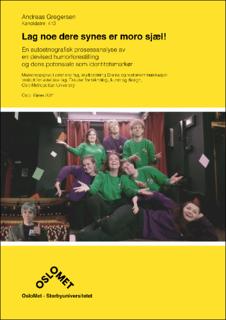| dc.contributor.advisor | Øfsti, Sara Birgitte | |
| dc.contributor.advisor | Underland, Niels Peter | |
| dc.contributor.author | Gregersen, Andreas | |
| dc.date.accessioned | 2021-08-24T08:41:35Z | |
| dc.date.available | 2021-08-24T08:41:35Z | |
| dc.date.issued | 2021 | |
| dc.identifier.uri | https://hdl.handle.net/11250/2770887 | |
| dc.description.abstract | Denne masteroppgaven undersøker hvordan en devised humorforestilling kan forstås som humor, som demokratisk fenomen, og samlet sett som identitetsmarkør for de involverte i prosessen. Gjennom en kvalitativ, autoetnografisk analyse av prosessen bak humorforestillingen Et glass til maten, fra mitt perspektiv som instruktør, er oppgaven tenkt som et potensielt verktøy for videre arbeid med slike produksjoner. Oppgaven presenterer teori om devised prosess, instruktørrollen, humor, komedie, og latterkultur, og empirien ses i lys av dette. Dataene belyser hvorfor noe kan kalles humor, hvordan dette kan fungere som demokratisk fenomen, og hvordan det kombinert kan forstås som identitetsmarkør. Hovedfunnene peker på hvordan målgruppetenkning i komedie forstås gjennom premissene for kommunikasjonen, og hvordan disse forklares gjennom tendensene: uoverensstemmende kollisjon, gjenkjennbare mønstre, overraskelse, distanse og ubehag. Gjennom dette forklares også Et glass til maten i kontekst av sin samtid og kultur, og tendensene i forestillingens intensjonelle uttrykk forklares også som demokratisk fenomen og identitetsmarkør. | en_US |
| dc.description.abstract | This master's thesis examines how a devised comedy show can be understood as humour, as a democratic phenomenon, and overall as an identity marker for those involved in the process. Through a qualitative, autoethnographic analysis of the process behind the comedy show Et glass til maten, from my perspective as a director, the thesis is intended as a potential tool for further work with such productions. The thesis presents theory about devised process, the director’s role, humour, comedy, and laughter culture. The empirical evidence is coherent with these theories. The data clarifies why something can be called humour, how this can function as a democratic phenomenon, and how it can be understood in summary, as an identity marker. The main findings, point to how target group thinking in comedy is understood through the premises of communication, and how these are explained through the tendencies: inconsistent collision, recognizable patterns, surprise, distance and discomfort. Through this, Et glass til maten is also explained in the context of its present time and culture, and the show’s expressive tendencies are hereby explained as a democratic phenomenon and identity marker. | en_US |
| dc.language.iso | nob | en_US |
| dc.publisher | OsloMet - storbyuniversitetet | en_US |
| dc.relation.ispartofseries | MEST;2021 | |
| dc.subject | Humor | en_US |
| dc.subject | Komedie | en_US |
| dc.subject | Identitet | en_US |
| dc.subject | Demokrati | en_US |
| dc.subject | Drama | en_US |
| dc.subject | Instruktørrollen | en_US |
| dc.title | Lag noe dere synes er moro sjæl! En autoetnografisk prosessanalyse av en devised humorforestilling og dens potensiale som identitetsmarkør | en_US |
| dc.type | Master thesis | en_US |
| dc.description.version | publishedVersion | en_US |
